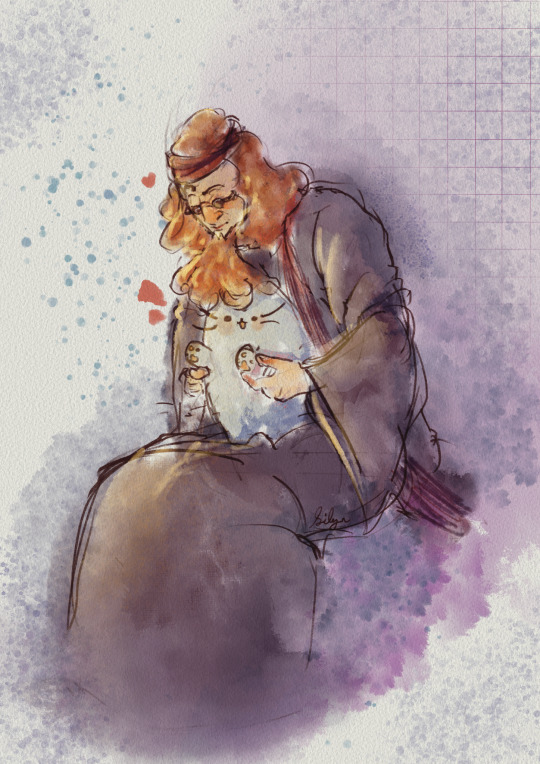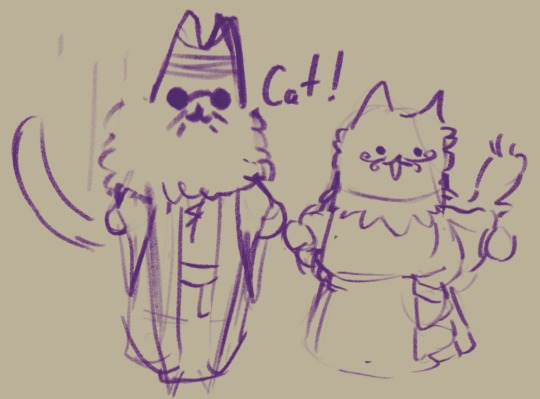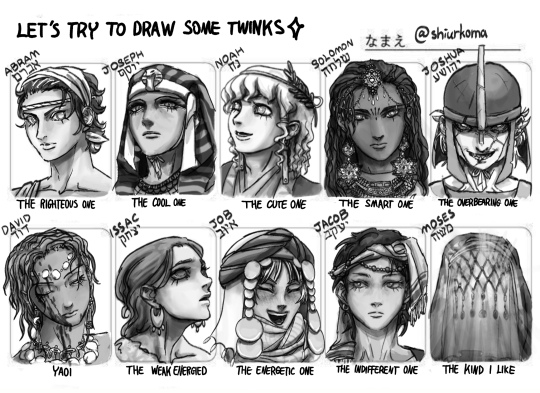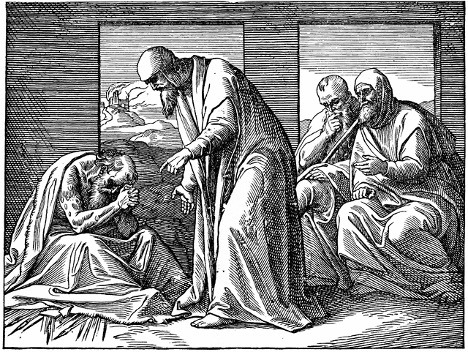#The Book of Job
Text
Good Omens: A companion to Owls- biblical-cinematographical references.






Since Cecil B. DeMille played such a big role, here are some side by side scenes from The Ten Commandments and A Companion to Owls.



And most importantly, side by side scenes with the Book of Job and A Companion to Owls.










#good omens#neil gaiman#crowley#ineffable husbands#aziraphale#terry pratchett#good omens fun facts#good omens 2#a companion to owls#cecil b demille#charlton heston#harold copping#easter eggs#ben hur#the book of job#david tennant#michael sheen#the ten commandments#cinematography
288 notes
·
View notes
Text

Ineffable May Day 11: The book of Job
Someone I knew wasn’t feeling very well for the past week or so, and asked for any possible feel good content. So enjoy this mash of vibes.

Pusheen Style Bildad and Azi 👀
#good omens#bildad the shuhite#bildad brainrot#good omens bildad#have a nice day#pusheen#gomens fanart#anthony j crowley#ineffable may 2024#watercolours goo weee#short animated gif in the works with these two!#the book of job#cat omens#my art#fan art#digital art
169 notes
·
View notes
Text
Did Crowley as Bildad intentionally allow the crows to bleat?
I think so.
He makes no excuses or denials. He doesn't try to hide or ignore it.
He stops, turns, and waits, watching Ariraphale with a carefully neutral expression. He waits and watches for as long as it takes for Aziraphale to realize the truth, continuing to have the crows bleat to drive the point home.
He would not kill kids, even if he can't directly say so, and he wants to make sure Aziraphale knows it.

#Because he's lonely and wants a friend T_T#Wait is this why he picked the name CROWley?#bildad the shuhite#bildad my beloved#good omens#good omens 2#the book of job#crowley#ineffable husbands
457 notes
·
View notes
Text
The crow flying in the background after Crowley goes: "Seems legit to meee!!!"

And bleating goats during the scene transition between Job's barn and house.
A+ television
64 notes
·
View notes
Text
rip Odysseus of Ithaca you would’ve loved the book of Job
44 notes
·
View notes
Text


Seeing how the bible doesn't usually make brawns a positive trait ( jacob vs esau, Samson, david vs the rest of his brothers etc.), we can somewhat conjecture that "beautiful men" in the bible isn't necessarily masculine, at least when compared to the standards in modern west.
Even the renaissance depictions of them are too buff in my opinion. They are too influenced by greek aesthetics, and greeks love their men beefy.
So there you have it, twink bible characters. Sorted them (very loosely) based on my own interpretation.
In my bible lessons i learnt that noah doesn't particularly like humans (he agreed to kill everyone all too happily and didn't try to bargain like abraham), so i made him smile. Its the moment god tells him he is going to destroy humanity.
Moses is my favourite flavor of twink because ARE YOU KIDDING ME HE IS WEARING A MASK THAT IS LITERALLY THE BEST THING IN ANY CHARACTER DESIGN EVER But really i think all of them turned out nice and I can't pick a favourite (maybe its joseph after all, not the most well drawn but he looks at you like he's looking at a piece of garbage how precious is that).
Translation of the chart probably not accurate since im not Japanese nor adept in their yaoi terms
#bible#the old testament#king david#joseph#job#moses#joshua#issac#noah#king solomon#jacob#genesis#exodus#the book of samuel#the book of kings#the book of job
28 notes
·
View notes
Text

THE BURIAL OF ATALA | 1808 | by ANNE-LOUIS GIRODET DE ROUSSY-TRIOSON
The painting depicts the solemn scene from François-René de Chateaubriand's novel where Chactas, an indigenous American, mourns over the body of his love, Atala, in a lush wilderness setting.
There are three figures in the painting: Atala, Father Aubry, and Chactas. Atala has her head turned to the viewer while her hands together in a prayer-like position. Father Aubry is standing beside her and is lifting her body while Chactas holds her legs. The background of the painting has been well detailed by the collection of tall trees helping to signify the sublime nature of the scene.
The overall painting is highly symbolic. The spade in the foreground speaks of burial. The lines from the Book of Job on the wall of the cave speak of the brevity of life. The cross in the distance speaks of the Christian theme. Against this background, Atala's white dress stands out graphically, indicating how pure and innocent she is even in death. The natural surroundings symbolize the untamed beauty and spiritual connection of the wilderness.
The figures of the painting depict immense emotion.Girodet succeeds in depicting profound sorrow and reverence in the scene. Atala has on a countenance, which is calm, but Father Aubry has on a sorrowsome one. Chactas' melancholy is all over as he hangs on Atala's legs. His body bends forward in a depiction of sorrow and resignation.
From the rough stone slab to the intricately rendered foliage and drapery, Girodet pays extremely close attention to the rendering of textures. The figures themselves are treated with a great sense of anatomical accuracy, not to mention emotional depth, which serves only to enhance the realism of the scene.
#the burial of atala#atala#father aubry#chactas#anne louis girodet de roussy trioson#francois rene de Chateaubriand'#the book of job#neoclassicism#romanticism#1800s art#1800s#oil painting#oil on board#oil on canvas#novel#art
18 notes
·
View notes
Text
I wish I had someone to talk about religion without a) the risk of being pulled into a sect; b) the risk of being told I should be burnt at the stake for blasphemy. Because I keep finding rather interesting things in the Bible. It so happened that I reread The Book of Job (after having watched Good Omens 2, obviously) and stumbled over a phrase I hadn’t paid attention to before.
"Now there was a day when the sons of God came to present themselves before the Lord, and Satan came also among them."
Not only they are on speaking terms and Satan is invited to a family gathering, so to speak. He’s also called a son of God. One of God’s sons.
They say you shouldn’t take literally what’s written in the Bible. But there’s no indication what things should be taken literally (like virgin birth or ascension) and what things shouldn’t. So… Satan offering Jesus all the kingdoms of the world was actually a brotherly gesture, huh?
29 notes
·
View notes
Text
So how do you think Job went about the rest of his life after all of that? I mean, he seems a little slow on the uptake; but his wife and kids know that Crowley’s a demon and they probably told him at some point. Do you think he ever reconsidered his belief in and devotion to god after god tried to kill all his kids, and the only reason they didn’t die is because a demon saved their lives/an angel lied to god to protect them?
23 notes
·
View notes
Text
OMG SAVING THE KIDS BY TURNING THEM INTO LIZARDS BYIYTJKYFKURDJKHNM
And the third one gets to be blue 🥺🥺🥺🥺 Crowley you sweetheart!😭
25 notes
·
View notes
Text
Catholic Understanding of the Book of Job
So after watching the first three episodes of Good Omens season 2, I did some research on the Catholic Church’s teachings on the Book of Job. I’ll admit, I did this because the show very pointedly highlighted some issues I’ve personally had with that book in the past. Namely, why does God test Job in this way, and why does He seem to harshly criticize Job when the man finally begs for answers?
Interestingly, this question about “why did Job suffer like this” is precisely the POINT of the Book of Job. This is a dramatic literary poem, one that’s often compared to other epic poems like Dante’s Inferno. It’s not a historical account. Job didn’t actually exist, and his suffering and God’s response are not real either. They’re an author’s attempt to describe and dramatize an innocent person’s suffering to make a point about the nature of suffering as a whole.
Specifically, the author is saying that suffering is not necessarily caused by a person’s sin. This was an extremely new idea at the time the Book of Job was written, which is why Job’s three friends try to convince him that he must’ve done something to deserve this suffering—they’re echoing the popular belief of the time.
So if suffering isn’t a punishment for sin, then what is it? The author offers a few suggestions: It’s a test of holiness, to ensure that people aren’t just fair-weather friends of God. It’s an opportunity for people to increase in holiness, by demonstrating patience and good virtue in the face of suffering. It’s a way of preventing pride (like Job’s kids clearly demonstrate in the show).
Ultimately, though, the author doesn’t give a conclusive answer. This is where God’s seemingly harsh response comes into play: By having God expound on His power and creation of the world, and how Job was not present, the author is saying that, while the options he presented are possibilities, he doesn’t actually know. God has wisdom far beyond any human, and plans that we can’t even begin to comprehend. We can’t truly understand His justice.
Despite His seemingly harsh rebuke of Job, the author shows that God is actually on Job’s side by having God reprimand Job’s friends for trying to convince him of fault, and then restoring his goods. The author’s saying that God isn’t just criticizing Job for lamenting his suffering, He’s making a point to the whole human race that none of them can understand His justice.
In addition, by having God restore twice Job’s goods, the author says that God is merciful and just—even though he doesn’t have to be. As Job just learned, God is the creator of all, and as such can do whatever He wants with His creation. However, the author has God choose to abide by the legal requirement at the time: If you harmed a man, you’re required to pay him twice what you harmed.
The Book of Job has many possible interpretations. It’s ultimate goal was to get people thinking about the nature of suffering, rather than blindly accepting the popular beliefs of the time. It’s unsurprising that the author couldn’t provide a conclusive answer to the question of suffering, as it’s a questions we still wrestle with today.
However, the New Testament offers some additional wisdom: Our earthly suffering is nothing compared to the heavenly reward we will experience if we remain faithful. This is a concept Job couldn’t even comprehend, as he had no idea what happened to souls after death, and people believed their reward for faithfulness would be given on earth. Thus, we see that our understanding of God increases over time: First, with the realization that suffering isn’t necessarily caused by sin. Second, by the realization that our reward is found in Heaven, not on earth. We may never completely understand the problem of suffering during our lives on earth. But on the day of the Second Coming, we will all witness God’s justice firsthand, and we’ll see even more clearly.
17 notes
·
View notes
Text

[I am sharing this eloquent post as a cry from the hearts of all people of good will ; when like Job we seek voice for our despair.]
* * * *
People both here and around the world have checked in to ask how I am. I appreciate this more than you can imagine. But it puts me in a bind as to how to respond, beyond to affirm my physical safety and that of my children.
Those of you who know me personally, or even at length virtually, know that I struggle to restrict my responses to such a question to generalities and formalities. On the other hand, I’ve been working over the past year, in the wake of radical upheavals in my personal life, to restrain my openness. Some see that openness as oversharing that overburdens them.
So, responding to this question is challenging.
Yes, it would be correct to say that I’m fine. Because in many senses I am. Especially if we contextualize this with how others are doing. And even in this situation, I try to remember that context, and I try to remember both the morality and usefulness of gratitude. But I don’t always find the strength.
So, for those who want more detail, here it is.
I’m angry. This is of course to be expected. Joe Strummer (because you knew I’d quote him somewhere here) once wrote “let fury have the hour / anger can be power / you know that you can use it.” He was talking about a rather simple situation of resistance. When anger is directed in one clear direction, and it’s righteous, then outrage, literally directing one’s rage outward, can be an antidote to despair and fear. And if directed effectively, can be a powerful force for change, or at least survival. But that’s not where I am. Because I’m angry in so many directions I struggle to find a center on which to stand. In some senses, all of my angers are pulling me apart.
Given this predicament, I want to add a caveat before I particularize them. I am conscious of being in extremis. I may change my view on many of the things I lay out here. I may repudiate them. I may be embarrassed by them. I may be very wrong about some of these things, though explaining to me how I am wrong, even if done with good will, likely won’t help either of us. At any rate, the question “how are you?” is in the present. This is how I am now. A snapshot of the moment.
Yes, I am answering because I know some of you are personally interested, and yes, I am answering because I need to speak, and I live alone, and because I am Ori. But I also know that some have found value (because they’ve told me so) in my openness in sharing my views and experience.
Nonetheless, I’d like you to keep in mind the most important line in the Book of Job. After Job loses everything and is subjected to intense physical and emotional trauma, he cries out to God, demanding an explanation. Three friends gather to discuss how he might continue to believe in a just and good God and the possibility of a just and good world. And they all mean well.
The friend who speaks last, Eliphaz the Temani, holds he most correct position. He’s really smart, even wise. He isn’t simply an orthodox (small ‘o’) apologist for religious dogma demanding fidelity. He probes the problem deeply and calls for a complex subject position and view of God and the world.
God then speaks to Job from out of the whirlwind, before pivoting to the friends, not addressing all three, but speaking directly to Eliphaz.
וַיְהִי אַחַר דִּבֶּר יְהוָה אֶת הַדְּבָרִים הָאֵלֶּה אֶל אִיּוֹב וַיֹּאמֶר יְהוָה אֶל אֱלִיפַז הַתֵּימָנִי חָרָה אַפִּי בְךָ וּבִשְׁנֵי רֵעֶיךָ כִּי לֹא דִבַּרְתֶּם אֵלַי נְכוֹנָה כְּעַבְדִּי אִיּוֹב.
“And after Hashem spoke these words to Job, Hashem said to Eliphaz the Temani, ‘I am incensed with you and your two friends, because you didn’t speak to me appropriately like my servant Job.’”
God doesn’t commend Eliphaz’s powerful theodicy, one that has provided many later rabbinic theologians – the Rambam (Maimonides) foremost among them (see the discussion of Providence in Part III of the Guide of the Perplexed) – with great intellectual inspiration. He doesn’t say ‘yep, well done Elushkeh, you got it right my brilliant child and your benighted brother Job just needs to listen to you.’ Rather, as the Rambam emphasizes, God rebukes him for being too invested in his own argument and correctness. The great Jewish historian Amos Funkenstein read Job as teaching that we don’t always deserve answers, but we have the right, and even obligation, to demand a hearing. Especially in extremis. Even if we are wrong or lost or broken or. . .angry.
With that in mind, my answer to the question “how are you?”, that I’m angry includes a list of things I’m angry about. In no special order and certainly no hierarchical ranking.
I’m angry at Hamas about the vicious slaughter and widespread trauma they inflicted, gleefully, on so many people.
I’m angry at Israel’s vaunted security and intelligence communities and institutions, whose often appalling moral decisions and violations of rights have been justified with recourse to the necessity for security, for nonetheless failing to keep us safe.
I’m angry at this absurd government led by a man who has time and again placed his own interests and power above duty to country, while posing as a superlative patriot. And has never paid a political price.
I’m angry at his party for clinging to him despite his amorality (or immorality) because doing so has served their own interests.
I’m angry that for years he funneled cash from Qatar to Hamas while posing as the only one who can keep Jews safe. And I’m angry that so many people bought into this. And angry that so many still do. I’m angry that more than 2% of the population somehow doesn’t want him to resign immediately.
I’m angry at everyone who voted for any party in this government who hasn’t apologized for empowering such a group of corrupt and irresponsible chauvinists and zealots.
I’m angry at Hamas for undercutting the struggle for Palestinian rights and lending credence to the caricatures of Palestinians as bloodthirsty savages who just want to kill Jews, which is far from the truth. This will not only cost Palestinian lives in the immediate, but it will also set back their pursuit of justice and dignity by decades. They have alienated hard-won support in the international community. And they have made it harder to stand for their recognition, rights, and justice. Here, in Israel, it makes answering the refrain that ‘they don’t really want freedom, they just want us all dead and gone’ exponentially more difficult. And they have reinforced the flawed attitude that any failure of brutality to subjugate others is evidence of the need for more brutality.
I’m angry at the harm that this will perpetuate for Israel and Israelis, now and in future generations, on so many levels. Dehumanizing themselves and us, dehumanizing us all, plunging us ever deeper into a morass of hatred and violence. There is no security and dignity for Israeli Jews if there is no security and dignity for Palestinian Arabs.
I’m angry at those on the right who are already waving this as vindication of their cruelty and hate-mongering.
I’m angry at those on the left who are celebrating this as valid resistance and a step in the direction of justice.
I’m angry at their glib equivocations that show zero compassion for individual lives.
One cannot seek justice for peoples if one isn’t seeking justice for people.
Justice only comes when we provide safety and dignity for all.
I’m angry at the arrogance of so many privileged people with little knowledge and enormous self-righteousness, who deny their own implication in a global system that has enabled this situation and glory in accusing others, and who celebrate or rationalize this slaughter as just desserts. Especially those who have never stepped foot here, haven’t read a 100th of what I’ve read, who don’t interact and work with Palestinians every day, yet who like to “educate” me about the Palestinian suffering I’ve witnessed, stay abreast of, and seek to alleviate. There is no justice without humility.
My supposed allies on the left in regard to so many causes, including justice for Palestinians, this isn’t about YOU.
I’m angry at those who obscure context and discredit it by calling it justification. Understanding something more deeply and broadly doesn’t mean one thinks it is just. To any and every brutal situation, some will inevitably respond with brutality. Others will not. That brutality is therefore inevitable, but not justified. It doesn’t exonerate someone who decapitates a parent in front of their child. It doesn’t exonerate someone who throws grenades at people who are dancing. It doesn’t exonerate someone who rapes or beats or shoots or bombs others. Systemic and historical analysis does not neutralize moral agency and responsibility. When we fail to attend to either, we are part of the problem.
I’m angry that someone next to whom I sat Shabbat after Shabbat for years in synagogue went to a music festival, had his arm blown off with a grenade, applied his own tourniquet, and now is a hostage in Gaza with no medical attention to his grave injury. And his parents and sisters, like so many others, are living a nightmare.
I'm angry that my youngest child has spent hours with her best friend, keeping her company, while she's overcome with fear for her beloved older brother (they are so close that one of his profile pictures is of the two of them) who was sent to the front.
I’m angry at myself that this is the world and childhood I’ve given my three children.
I’m angry that I did not build a career that would have given me a meaningful role of some sort in this crisis. I’m angry at the reasons I didn’t do so, many of which have to do with an illness I was both born with and that was exacerbated by my experience and failures to overcome it.
I’m angry at my supposed allies here in Israel who have refused to recognize that democracy and dignity for only some is a delusion. In fact, it is democracy and dignity for no one.
I’m angry that my country is filled with creative energy and courage when it comes to technology and the arts, but absolutely devoid of any creativity and courage when it comes to politics.
I’m angry that I once found Israel’s precariousness romantic and thought it provided a more authentic experience of life and greater purity of commitment and affiliation.
I’m angry at the dishonestly partial and propagandistic education that informed those sentiments.
I’m angry at those who have turned my people’s traditions into distorting mirrors of superiority and cudgels of cruelty.
I’m angry that thousands of Palestinian children will be killed and traumatized in the next days and weeks.
I’m angry that my own children’s immediate welfare and that of my people, and the immediate welfare of another people and its children, are now seemingly mutually exclusive.
I’m angry that I don’t currently possess a plausible vision for a better future.
I’m angry that I live by myself and that the nights are very very long.
I’m angry that this week will forever shape my children’s lives, and my own.
And I’m angry that, unlike Job, I don’t have the kind of faith that gives me an address to demand a hearing and express my anger.
So if you’ve read this, you will have to do.
And I’m angry that some who read this will feel pain.
[Ori Hanan Weisberg]
11 notes
·
View notes
Text
Job. Oh Job. I’m sorry
#I wouldn’t be as strong#and you were#but at what cost job#you lost everything#everything#and we want to lose everything too#don’t we#we want to lose to prove ourselves#to prove we are holy#for what is holier than sacrifice#than martyrship#I’m sorry job#the book of job#bible study
3 notes
·
View notes
Text
When Aziraphale and Crowley first meet during The Trial of Job, both of them try to recount when they'd last met. But the eyes they made, and the pauses they had, before saying "The Flood"....genuinely makes me think they spied on each other multiple times in between. Maybe coz their head offices asked to, maybe other reasons.

And in those moments they were both going SHIT SHIT when am I SUPPOSED TO last have seen them?? If I remember wrong THIS LITTLE SHIT will NEVER let me live it down!!!
39 notes
·
View notes
Text
When we are passed over for promotion or lose a job, when we become chronically ill, when we lose people we love, what then? We face the question, “If God was blessing me during the good times, is he punishing me now?” This is a hugely important question. If God is punishing us, we need to change our ways so he will stop. But if our difficulties are not a punishment from God, then changing our ways would be foolish. It might even oppose what God wants us to do!
The Bible reveals that sometimes our suffering is not a result of our sin. Consider the example of Job. He suffered greatly, losing his substantial wealth and his family. His friends urged him to admit that it was divine punishment because of his sin, but Job resisted, insisting that he had not deserved his sorrow. In the end, the Lord rebuked Job’s friends, revealing that they had not spoken rightly about God when they said God had been punishing Job. In fact, it was Satan who had caused Job’s suffering all along! [Nevertheless,] we are not told why God allows Satan to torture Job. One harrowing day, nearly everything Job treasures is stolen. The people he loves—including all his children—are murdered or killed in violent storms. But Job neither assumes God is punishing him nor becomes bitter over God’s treatment. Instead he worships God.
Because Job has experienced prosperity as a blessing from God, he is prepared to suffer adversity without jumping to conclusions. He recognizes the limits of his own understanding. He doesn’t know why God sometimes blesses us with prosperity and sometimes allows us to suffer adversity. He just knows that God is faithful. [When we, too,] know that sometimes [our] suffering is caused by forces [we] don’t now understand, [we can prayerfully ask God to] help [us patiently] suffer adversity without jumping to the conclusion that it is a punishment. Instead, [our trust in God's faithfulness] will lead [us] to worship and trust [Him] always.
Theology Of Work Project
#suffering#the book of job#this is very relevant to my life lately#i needed to hear this so badly tonight#god is faithful#for everything there is a reason#trust in God#radical surrender#theology of work project#punishment#faith#reflect on this
39 notes
·
View notes
Text
Thank u Good Omens for highlighting how absolutely fucked up the book of Job is in the Bible
#like why was all that necessary this poor man#the book of job#the Bible?? do I tag that??#good omens#good omens s2#good omens spoilers
10 notes
·
View notes